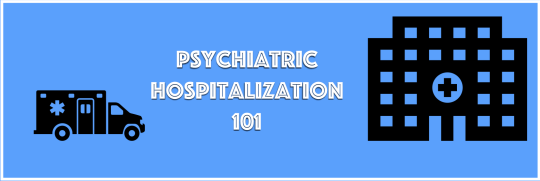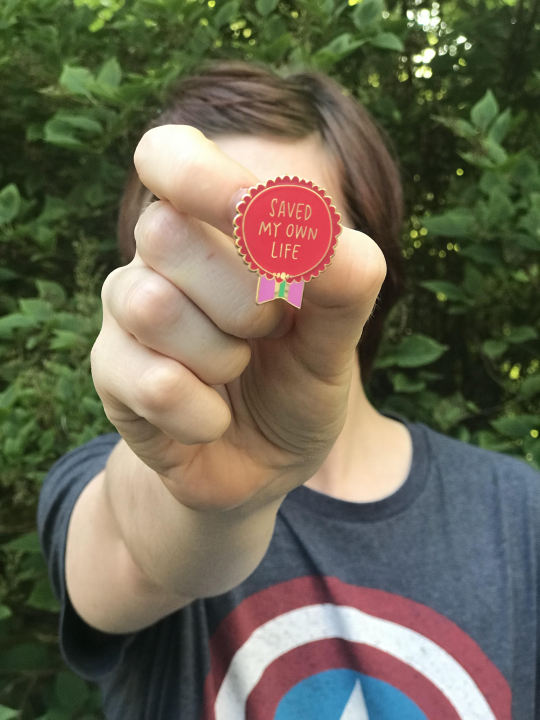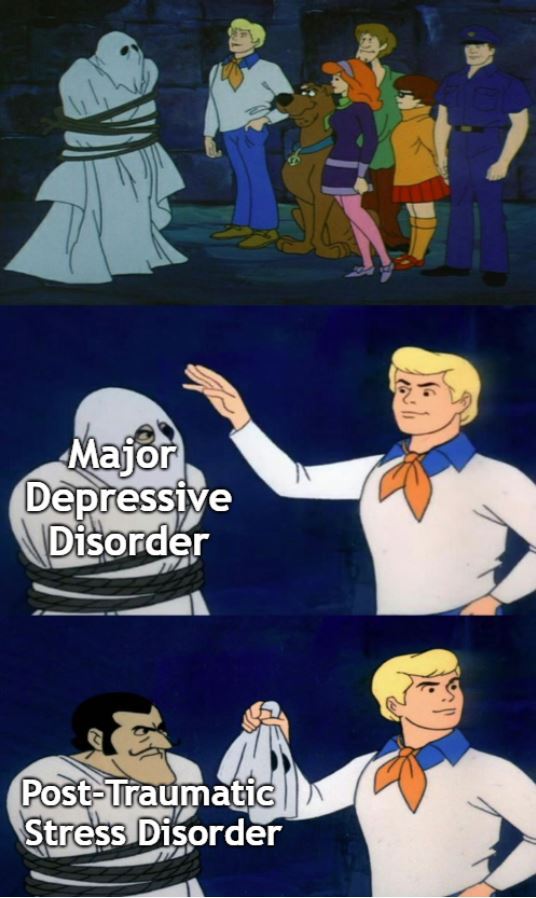Text
Host: Talks about how he has multiple voices inside his head
Host: Talks about how sometimes he has different handwritings
Host: Talks about how sometimes he acts completely different and doesn't really know why
Host: Talks about how he sometimes will blank out and forget things that he did completely
Host: What do you mean I have OSDD? That doesn't sound right. I don't have any of the symptoms
85 notes
·
View notes
Text
"Most dissociative parts influence your experience from the inside rather than exert complete control, that is, through passive influence. In fact, many parts never take complete control of a person, but are only experienced internally. Frequent switching may be a sign of severe stress and inner conflict in most individuals. However, for some patients with DID, switching in daily life is common." -Coping with Trauma-Related Dissociation by Boon, Steele, & Van der Hart.
I was reading and wanted to post this because 1) I've seen a lot of posts on here talking about switching, and wanted to remind folks that if you don't switch often, or you rarely switch, you're valid! and 2) I've seen several posts wondering if it's typical to experience more switches when sick or stressed, and reassure folks that it's not uncommon.
- Blue
236 notes
·
View notes
Text
tumblr
Pudge wants to say something
15K notes
·
View notes
Photo

Psychiatric Hospitalization 101
So you’re about to save your own life by going to the hospital- here’s what you need to know:
~disclaimer: I am not a healthcare professional nor have I worked in a hospital. I am simply someone who has been hospitalized multiple times. This is about acute, short-term psych hospitalization. My word is not law~
The Truth
First off, let me tell you the truth. The truth is that being hospitalized is one of the bravest things you can do. You have chosen (or perhaps you haven’t) to save your own life. Not to beat the physical vs mental illness comparison to death, but conceptually this is like going to the hospital with a broken leg to get a cast. You’re treating an acute wound, going to get a tune up, going to a safe place to heal. Unfortunately there is a stigma involved. It’s been decreasing recently and I think you’ll find psych hospitalization is a lot more common than you imagine. But it still exists. You can be proud of taking this step. It will be hard, but you’ve made the right choice.
When to consider hospitalization
Being suicidal is one of the most common reasons for hospitalization. Psychosis, panic attacks, and substance abuse are others. The main factor for choosing to hospitalize is whether you think you can survive the episode you’re having. If you’re even questioning it, hospitalization is probably a good idea. If you’re choosing between your life and the hospital, the hospital is always the right answer even if it doesn’t seem that way at the time.
The process
There are two ways to be hospitalized: through the ER and straight to the unit. The ER is the most common way. Occasionally your therapist or psychiatrist or other healthcare provider will be able to bypass the ER for you and get you straight into a bed on a unit. If you have this opportunity, definitely take it.
If you go the ER route, you arrive and explain why you’re there. You’ll then be taken back into a room- sometimes a private room, sometimes a communal psych room. Sometimes your phone will be taken. A guard will be stationed near you to ensure you do not hurt yourself or try to run away. You may wait for hours. You’ll see a psychiatrist who will determine whether to commit you to the psych unit or send you home. If they decide to commit you, you’ll be wheeled to the unit.
For me, the worst part of the process is the ER. You’re often helped by healthcare professionals who are judgmental of mental illness or are too busy to enact kindness. It can be a very dehumanizing experience. You may regret coming to the hospital, but you did the right thing. Saving your life is always the right thing. It’s okay to regret it for a bit as long as you follow through.
What to pack
Your belongings will be confiscated upon your arrival but if you have a chance to pack or if you have someone to bring you stuff, consider these:
A warm comfy outfit like sweats (but without a string at the waist!!!!!! take it out or they won’t let you have them!), SOCKS, pjs. Loungewear basically. The hospital provides basic toiletries, socks, and gowns/scrubs/paper pants. They can provide underwear and pads as necessary. Pack a hair brush if you’ve got tangly hair bc whatever they give you will NOT suffice.
You may want to bring your medications just in case the hospital doesn’t have them in their pharmacy but you will not have access to them, all your meds will come from the hospital itself.
Books! Some hospitals have a small library but you can bring your own if they’re deemed appropriate by the staff. They provide stuff like coloring pages, puzzles, games, etc but it can get p boring.
BRING A WRITTEN LIST OF IMPORTANT PHONE NUMBERS. YOUR PHONE WILL BE TAKEN.
You will have to ask to have items you arrived with brought to you from your belongings bag. Occasionally they will be reluctant, but you can self-advocate your way through it.
On the unit
If you came to the hospital in the evening you may get little sleep that first night. You have to do the intake where they ask you all the questions and you sign a bunch of forms. You must be up for breakfast the next day. That first day you won’t get to choose your own meals but you will fill out a meal card for the next day.
Most of your day will consist of shuffling between different mental health groups. Mental Health Professionals (often social work masters students) run groups on addiction, coping skills, community resources, gratitude etc etc in addition to your stereotypical group therapy. There are 3 meals a day, snacks available, and lots of downtime. There’s also activity hour where you do crafts or play games. During activity hour in my last hospitalization I painted a cackling coffin (it was October). 10/10.
You will have a roommate. My experience is that you both mind your own business while being kind and it’s generally okay.
They will take your blood pressure and vitals at least once a day. It’s annoying but necessary. They may do labs and draw your blood depending on your circumstances. If you have a physical illness as well, it may be a battle to make sure you are seen and treated for that too. All I can say is be your best advocate.
You will not have your cell phone. This will be stressful at first but hopefully nice after a bit. You can call whomever you want using the hospital phones that are on during downtime. You may have to ask the staff to dial if it’s out of the hospital area code. People can also call you if they know where you are. Do what you need to do but also don’t be the Phone Hogger bc we all want to use it too.
Visitors are allowed during certain hours. It’s not like a regular hospital visiting situation where they can just sit by your bed for hours. It’s like once a day for an hour you can get a visitor, no more than two at a time or whatever the rules are. No one can visit or call you without your permission. Visits by loved ones are so so nice and make you feel human again. I would encourage finding someone you trust who can visit you. It can make a world of difference.
“How can I get out faster?”
This is a hack question tbh. I know everything sucks but you are there to heal first and foremost. Generally they release you when the psychiatrist thinks you’re ready to go. The average stay for something like an acute suicidal episode is 3-5 days. That’s enough time in the dr’s eyes for you to stabilize and receive any medication changes. If you are on the unit voluntarily, you can technically leave at any time. I’m not sure I’ve seen anyone insist on it though. Ask your doctors when they are considering releasing you so you can plan. They may change their answer so casually check in now and then.
Go to groups and participate in them. If you’re hiding in your room all day the nurses will notice and they do write that down. There may be many people on the unit, but the nurses are keeping track and taking roll. If you can, be open, honest and compliant with your treatment team. Now there’s a part of me that goes “Fuck The System!!!! Fuck being compliant! I am my own woman and my illness is Me and not something to be stigmatized or hidden. Take me to Bitch Planet, bitch!!!” This is totally valid. You just have to decide what is more important to you- being noncompliant in the face of a judgmental system or getting back to the world. As much I want to rebel, my perfectionism and people pleasing tend to kick in by the second day on the unit.
The aftermath & “what do I tell people?”
When you are being prepped for release, you must have appointments with your outpatient treatment team set up. If you don’t already, the hospital will schedule them for you. If there’s someone who can pick you up, utilize that. Otherwise they may set you up with a cab or something depending on the location. You will be given the bag containing your phone and other belongings upon release.
It is up to you to decide what to tell people about your stay on the unit. You can be honest with whomever you choose, but you don’t have to be. You can say you were out of town or had a family emergency or whatever you want. It is not your responsibility to break the stigma. If you can and want to, go for it! We will all appreciate it. But you don’t have to advocate if you don’t feel comfortable. I tell many of my friends and family the full truth and then tell others that I was “in the hospital.” If they ask questions I say I don’t want to talk about it. This works better than you might think. (It surprised me how respectful people are when you say you don’t want to talk about something.) Most people won’t even ask, tbh.
It’s not all garbage
It’s not all drugged up zombies and Dissociation Time: my last experience was pretty lit. We had morning “stretches” to ‘80s bops. We played Wii bowling. We discussed aliens and conspiracy theories. In a place with such a heavy stigma on it, it was a surprisingly Shame-Free environment. It was comforting to be in a place where everyone Got It. At night we would get our meds and then drift off to bed one by one as the meds hit to goodnights of “ope, the Seroquel’s kicking in.” The variety of people on the unit proves that mental illness affects everyone, from the college student to the 75-year-old retired man to the soccer mom with 3 kids. And they each have different ways of coping, different perspectives on their situation. These other perspectives can be inspiring, even helpful and you may pick up as many tips from your peers as the actual professionals. Respect your peers, don’t be that person who’s like “why am I, Normal Person, locked up with all these Crazy People?” If you’re in there, you’re all in the same boat. Crazy is a slur and no one there is crazy unless they choose to reclaim the term.
The staff can be quite kind as well. I once had a nurse go down to the gift shop to get me a tiny hair brush for my waist-length tangled hair. He didn’t have to put in that effort but he did. This past time I had an MHP sit with me after a session and develop personalized affirmations that she wrote in my journal with her gorgeous, swooping handwriting. It’s small things like these that end up mattering most in an environment that can feel harsh. There can be great kindness there, under all the rules and regulations, you just have to be open to it.
I’ve made a wide range of friends in hospitals. Ones I’d never have even encountered in real life. Even though we haven’t kept in touch, I think of them often. My roommate with terminal kidney failure who got ECT twice a week but took the time to ask how I was. A recent immigrant from Nepal who didn’t speak any English but with whom I communicated anyway. Sandy, my homeless roommate who gave me all of her toiletries instead of taking them with her. Trevor, a young heroin addict who guarded my chocolate cake when I had a phone call. Curtis, a retired professor deep in psychosis whom we taught to Wii bowl. There are so many different lives that tangle with each other on the unit. In this way I consider it a gift, to have a window into all these different worlds that are connected by this one string. I’ll never see these people again, but I’ll never forget them either. I hope they’re all still out there, getting by.

Getting hospitalized can be one of the scariest and hardest experiences but it is also one of the bravest. You saved your own life. Even if you didn’t bring yourself in, your participation saved it. It is a chance to reorient yourself to life, to recovery. It is a second, a third, a 15th chance. It’s like a terrible mini vacation. Responsibilities are lifted so you can focus on yourself. Utilize it if you can.
Again, my word is not law, it is based on my own experiences on the inside and outside of psych units. Please please reply or send asks with your own information. I know I’m not the only one on here who’s been hospitalized. We are legion. We survived. We survive.
**Note from Kat: I am trying to learn graphic design (is my passion™) but the struggle is real and it does NOT come naturally so if anyone wants to help hmu!!!!! Can’t pay obvi but can link!**
6K notes
·
View notes
Note
is maladaptive daydreaming relate to DID or a separate thing?
We answered a similar question here. The takeaway is that while maladaptive daydreaming may be connected to dissociation in some ways, not everyone who could be considered to be a maladaptive daydreamer can be diagnosed with a dissociative disorder, and certainly not everyone with a dissociative disorder or with DID is a maladaptive daydreamer!
Maladaptive daydreaming disorder has been hypothesized by some to be a dissociative disorder, and it’s considered by Somer (who was one of the first to research the condition) to be similar to dissociative disorders. However, when Somer did a study on 6 individuals with it, only 4 could be diagnosed with a dissociative disorder based on screening with the Hebrew DES and Structured Clinical Interview for DSM-IV Dissociative Disorders Revised. The other 2 participants were instead diagnosed with narcissistic personality disorder. The 4 participants with dissociative disorders had been abused, and one of the two narcissistic individuals had witnessed physical violence between their parents… Somer claims that maladaptive daydreaming may be a learned coping mechanism for creative children and a way to avoid unwanted stressors.
I hope that this helps,
Katherine of Those Interrupted
89 notes
·
View notes
Text
Are you faking DID?
Last year, I was officially diagnosed with dissociative identity disorder, and let me tell you that I was shocked.
After getting misdiagnosed with almost everything out there, I was diagnosed with something that I never thought I could have, ever.
A couple of months later, I started going into the self doubt spiral.
This is my advice for systems doubting themselves:
Doubting yourself is completely normal. DID is meant to be covert and hidden, it’s a defense mechanism after all, almost every system out there doubted their experience at some point, it’s okay.
NOT EVERY SYSTEM IS LIKE SYSTEMS ON TUMBLR. Oh my god, I WISH someone would have told me this last year. You don’t have to have a bed in your room for each alter. You don’t have to have perfect communication with your alters. You don’t have to talk with them on a daily basis and switch 1000 times a day, just no. My communication with my alters is terrible. I sometimes go months without fully switching, days and even weeks without alters talking in my head. My alters mostly work through passive influence and that’s okay. You really don’t have to have a system like the ones you see on here to be valid, please remember that.
Not everything’s “you’re valid uwu”, no. Sometimes you make mistakes, sometimes doctors make mistakes and it’s okay. There are a lot of disorders that might have a similar presentation to DID like BPD, schizophrenia or bipolar disorder. You need to be completely honest with yourself about your experiences. You really don’t want to get misdiagnosed and get treated for something that you don’t have “terrible idea, believe me”. If you’re honest with yourself about your experience, then there’s nothing to worry about.
Please don’t obsess over labels. There was this time when I was almost always co conscious with my protector and I kept wondering if I actually have OSDD, and it made me really depressed. It does not matter whether you have DID or OSDD, they’re almost the same thing and the point is, you have gone through trauma that fractured your identity so it really doesn’t matter what you have. Doctors treat symptoms, not labels. It’s okay to be confused for a while ❤️.
Yes, alters can go dormant for a lot of time and that’s completely normal. No, that doesn’t mean that you’re faking.
Sometimes you can switch without knowing or noticing the switch, so don’t obsess over why you aren’t switching too often.
It takes A LOT of time to have a good communication with your alters. It really isn’t as easy as tumblr makes it seems to be.
You don’t have to have obvious and overt symptoms of DID to be valid. I haven’t had so many proofs of my amnesia, only 4 times or something. I have also never experienced dissociative fugue, and that’s okay.
Amnesia for your own amnesia. Sometimes you don’t even notice that you lost time or that you said something that you have no memory of until someone points it out. So again don’t obsess over not switching too often.
DO NOT, I repeat, DO NOT focus too much on your alters or your disorder. Do not go googling symptoms of DID and reading tons of articles for hours. This is just gonna make your self doubt much worse. It’s okay to learn about your disorder, just don’t do it too much because everyone experiences DID differently and that might increase your doubt.
Always keep in mind that DID is different for everyone. My best friend has DID and our systems are completely different. He switches much more often and he has no idea how many alters does he have, doesn’t know their names or anything about them, however my amnesia is much worse than his. Seeing systems acting differently doesn’t mean that you’re fake.
Since I brought this up, it’s okay not to know anything about your alters. I have around 16 alters and maybe more, I only know and have communicated with 6 of them. Again, it’s not as easy as tumblr makes it seems.
It’s okay not to feel like you’re a multiple. It’s okay not to refer to yourself as “we”. I personally never refer to myself as we unless I’m talking specifically about me and my alters.
It’s okay to have more overt symptoms after getting your diagnosis, and it’s also okay for your symptoms to be less after diagnosis. It’s really common that alters start being much more visible after diagnosis, that doesn’t mean you’re faking. Despite being less common but it’s okay to have less symptoms after getting diagnosed. Your alters might be just scared, I have experienced this and it made me feel like I was faking it all, but it doesn’t. Sometimes, your alters are as scared as you, maybe even more.
I wish someone would have told me this last year, so here I am, telling you why you shouldn’t worry, this too shall pass, trust me.
Also, feel free to add your own advice.
If you need anything, don’t hesitate to message us, we’d be more than glad to help!
Stay safe ❤️
#i love this post. i love this post. i love this post.#seriously this is so. much. help.#thank you op.
6K notes
·
View notes
Photo



Let yourself feel.
Thanks for the inspiration @kindersuggestion :)
169K notes
·
View notes
Text
Types of triggers
Here is a list of 12 categories of triggers, taken from the book The Post-Traumatic Stress Disorder Sourcebook Second Edition, by Glen R. Schiraldi, PhD. Having a list of a bunch of different categories of triggers can make them easier to conceptualize, and it certainly serves as a good reminder that a trigger can be anything that reminds you of a traumatic event (even if you cannot see the connection between the trigger and your trauma yourself).
Here's the list(note: the list itself is taken from the book, however the examples are my own [save for #12]):
Sight (visual): Seeing someone with red painted nails might bring up memories of an abusive family member who also wore red nail polish.
Sound (auditory): The sound of fireworks might remind someone if gunshots.
Smell (olfactory): The smell of a specific perfume or cologne might remind someone of an abusive partner.
Taste (gustatory): Eating a steak might bring up memories of family dinner time, and family dinner time was always filled with tension.
Body (physical):
Tactile/touch: Being hugged might feel similar to being forcebly held.
Internal body sensations: The heart pounding fast might remind one of a traumatic time when their heart beat in a similar fashion.
Kinesthetic/proprioceptive means the sensation of movement, tension, or body position. For example, I once put my head under my pillow and closed my eyes, which triggered a flashback about an abusive time where my body was in that same position.
Pain: Nausea might remind someone about a time when they were severely sick.
6. Significant dates or seasons
Anniversary dates of the trauma or other significant dates: Halloween, Christmas, RA/SRA. Someone could become distressed on the birthday of a family member that they cannot visit due to safety reasons.
Seasons of the year with their accompanying stimuli (temperature, lighting, colors, sounds): If something bad happened to someone during fall, they might have emotional or full flashbacks during fall. The crunching of the leaves, leaves changing their colors, and the cold breezes may be unwelcome intrusions.
7. Stressful events and arousal: Sometimes your brain may interpret any stress signal as a recurrence of the original trauma, due to changes in the brain (yep, trauma changes your brain!). Sometimes, seemingly unrelated events are triggers. Here are some examples:
•Arguing with your partner may trigger memories of family members arguing.
•Having to give your college teacher a reason for being late to class may feel similar to your family's strict household, where you couldn't be late for anything.
•A friend rolling their eyes may be reminiscent of a condescending family member.
8. Strong emotions: Feeling lonely can remind one of being abandoned. Feeling scared can remind one of times when they were scared before and things did not go so well for them.
9. Thoughts: If you do something that you perceive as upsetting someone, you may have the thought "I am a bad person", which triggers the same thought that occurred when you were abused at a young age.
10. Behaviors: Playing a shooting game might remind a veteran of the war.
11. Out of the blue: Sometimes intrusions occur when you are tired, or relaxing. A thought or something you're not aware of could elicit symptoms; so might the habitual act of dissociating during stressful times.
12. Combinations: Often triggers contain several memory aspects at once.
An important thing to note here is that you may not be aware of what triggered you. You may just suddenly be flooded with memories. You may not even be flooded with memories, you may "just" feel bad (emotional flashback), without clearly knowing why. Often, you are only subconsciously aware of your triggers, at least at first. That isn't the case with everyone though, and certainly not all the time. Triggers are manageable with some practice and coping skills and you can triumph over them. We'll hopefully be making a post on that sometime in the future.
766 notes
·
View notes
Text
me: *literally says anything*
therapist: can you…. give me an example?
me, someone who has memory problems:

333K notes
·
View notes
Note
hey! do you have any idea where to find proper explanations of did and osdd, I found out I have one of those and I'm trying to properly learn abt it and understand myself but I'm struggling so bad to find resources that are correct and readable
So you found out you have DID/OSDD, which means you either kind of figured it out on your own, or a professional suggested that you have either of them. If the latter is the case, then you should probably ask your therapist/psychiatrist/doctor about resources & help you understand your diagnosis. If you’re self diagnosed you should see a professional either way because DID/OSDD can’t be handled alone. You can’t get better on your own, you absolutely need professional help.
That being said, no matter how you came to the conclusion that you have DID/OSDD, finding good resources is important and certainly helpful.. but also very hard. A lot of the resources you’ll find on tumblr are either blatantly wrong or incredibly subjective, as every single person experiences having DID/OSDD differently. No two systems are the same.
Here’s a few websites (and blogs) that I found really helpful:
http://traumadissociation.com/dissociative.html
https://www.beautyafterbruises.org/blog/tag/OSDD
http://did-research.org/index.html
https://www.healthyplace.com/blogs/dissociativeliving
https://this-is-not-dissociative.tumblr.com/
https://www.isst-d.org/
https://www.discussingdissociation.com/
https://firedrake.tumblr.com/did
https://multiplicityandme.tumblr.com/
There are also youtube channels you can check out, that were actually made by systems! In some cases the videos can be a little dramatized but the information can be really helpful nonetheless.
MultiplicityAndMe
DissociaDID
The Entropy System
I hope this helps!
- Haku
12 notes
·
View notes
Text
Raise ur hand if u ever feel like your trauma wasn’t “serious” enough to justify your reaction to it and u feel like a fake victim every day of your life!!!!!
58K notes
·
View notes
Text
don’t you just love how mental disorders are basically buy one get seven free
218K notes
·
View notes
Text
It’s gross, but some sick part of me enjoys the fact that my mental health is so messed up. Some sick part of me that’s like yes, I hope this gets worse, it’s not that bad, I hope this gets worse, I deserve to get worse.
I deserve to get worse.
12K notes
·
View notes


